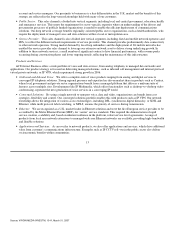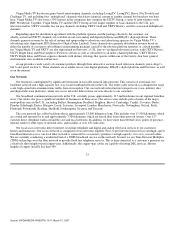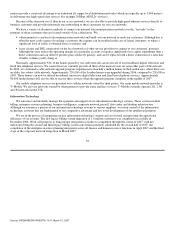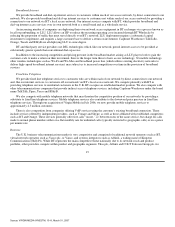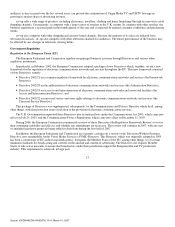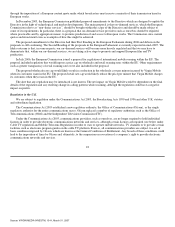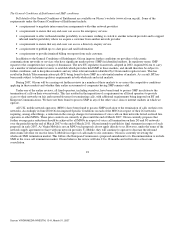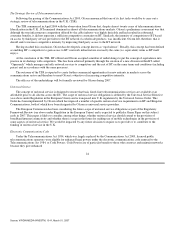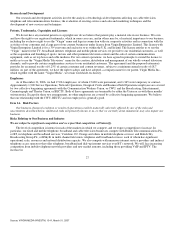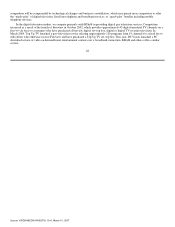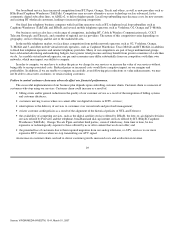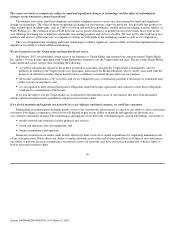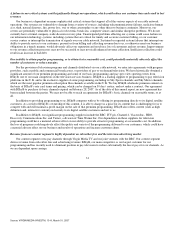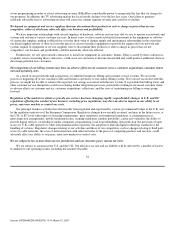Virgin Media 2006 Annual Report Download - page 26
Download and view the complete annual report
Please find page 26 of the 2006 Virgin Media annual report below. You can navigate through the pages in the report by either clicking on the pages listed below, or by using the keyword search tool below to find specific information within the annual report.
through the imposition of a European content quota under which broadcasters must reserve a majority of their transmission time for
European works.
In December 2005, the European Commission published proposed amendments to the Directive which are designed to update the
Directive in the light of technological and market developments. The main proposal is that on−demand services, which the European
Commission refer to as “non−linear services”, should be brought within the scope of the Directive and should be made subject to
some of its requirements. In particular, there is a proposal that on−demand service providers such as ourselves should be required,
where practicable and by appropriate means, to promote production of and access to European works. The Commission cites content
quotas and investment levies as examples of how this might be achieved.
The proposed amendments to the Directive had their First Reading in the European Parliament during 2006 and debate on the
proposals is still continuing. The Second Reading of the proposals in the European Parliament is currently expected in mid−2007. The
likely outcome is that, in some respects, our on−demand services will become more heavily regulated and that we may have to
demonstrate that, within our on−demand services, we are taking active steps to promote and support European film and TV
production.
In July 2006, the European Commission issued a proposal for regulation of international mobile roaming within the EU. The
proposal included regulation that would impose a price cap on wholesale and retail roaming rates within the EU. Other requirements
such as greater transparency of retail roaming rates were also included in the proposal.
The proposed wholesale rate cap would likely result in a reduction in the wholesale cost per minute incurred by Virgin Mobile
when its customers roam in the EU. The proposed retail rate cap would likely reduce the price per minute that Virgin Mobile charges
its customers when they roam in the EU.
The date that any regulation may be introduced is not known. The net impact on Virgin Mobile would be dependent on the final
details of the regulation and any resulting change in calling patterns whilst roaming, although the regulation could have a negative
impact on profits.
Regulation in the U.K.
We are subject to regulation under the Communications Act 2003, the Broadcasting Acts 1990 and 1996 and other U.K. statutes
and subordinate legislation.
The Communications Act 2003 established a new regulatory authority, the Office of Communications (Ofcom), as the single
regulatory authority for the entire communications sector. Ofcom replaced a number of regulatory authorities such as the Office of
Telecommunications (Oftel) and the Independent Television Commission (ITC).
Under the Communications Act 2003, communications providers, such as ourselves, are no longer required to hold individual
licenses in order to provide electronic communications networks and services, although certain licenses are required (see below under
Cable TV regulation and Mobile Telecoms Regulation) in order to own or operate mobile networks, TV channels or to provide certain
facilities such as electronic program guides on the cable TV platform. Even so, all communications providers are subject to a set of
basic conditions imposed by Ofcom, which are known as the General Conditions of Entitlement. Any breach of these conditions could
lead to the imposition of fines by Ofcom and, ultimately, to the suspension or revocation of a company’s right to provide electronic
communications networks and services.
22
Source: VIRGIN MEDIA INVESTM, 10−K, March 01, 2007



